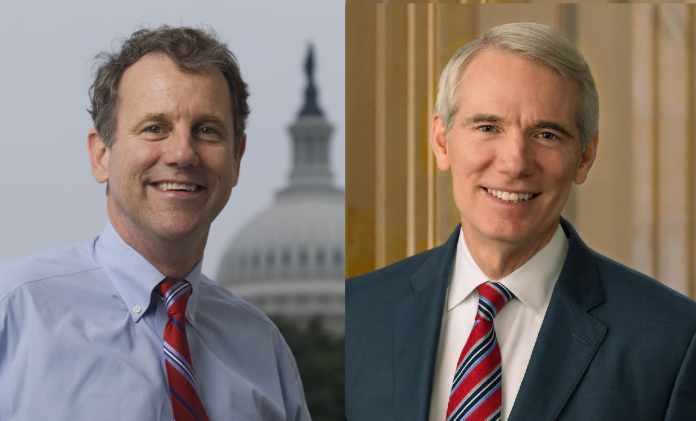U.S. Sens. Rob Portman and Sherrod Brown are singing much different tunes this week than they did in 2016.
The recent death of Supreme Court Justice Ruth Bader Ginsberg has led to an unexpected vacancy with the General Election just six weeks away. Both parties are gearing up for a legislative and presidential showdown — should President Donald Trump nominate a quick replacement for a swift hearing in the Senate, or should the presidential winner this fall earn the chance to make a nomination in 2021?
A similar scenario played out last presidential election cycle, when the February 2016 death of Antonin Scalia left a vacancy on the high court with nearly nine months until Election Day.
Portman and other Senate Republicans advocated then for waiting until after a new president was elected, while Brown fought for his Democratic Party’s judicial nominee to get a hearing and be confirmed.
The Republican majority in the Senate won in the end, never holding a hearing throughout 2016, and Trump wound up filling the seat after being elected that November.
Four years later, the roles are reversed.
Here are public statements from the two senators from 2016 and how they differ from their positions in 2020.
Portman’s precedents
Portman now says there is a major difference between the two presidential years which helps to explain why he did not support a confirmation hearing then but does this time.
In 2016, President Barack Obama was a Democrat and the Senate was controlled by Republicans. In 2020, Trump is a Republican and his party still controls the Senate.
The parties being opposite in 2016 is the reason a confirmation hearing should not have been held, Portman said in a statement this past week.
“Since the 1880s, no Senate has confirmed an opposing-party president’s Supreme Court nominee in a presidential election year,” Portman said. “In contrast, when the presidency and the Senate are controlled by the same party, the precedent is for the president’s nominees to get confirmed.”
However, Portman did not raise the issue of opposing parties back in 2016, a review of his statements and interviews shows. Instead, the Cincinnati Republican centered his argument on the proximity of the General Election.
On Feb. 15 of that year, two days after Scalia’s death, Portman issued a statement noting that Americans “are in the midst of a presidential election and a vigorous debate within both political parties on the direction of the country, with the election less than nine months away.”
He continued, “I believe the best thing for the country is to trust the American people to weigh in on who should make a lifetime appointment that could reshape the Supreme Court for generations.”
Portman then cited a precedent that the Senate should not act on lifetime appointments during the last year of a presidential term.
As 2016 went on, Portman continued to reference the upcoming presidential election — not the issue of opposing political parties — as reason to wait.
“There’s not going to be a hearing,” The Columbus Dispatch quoted him as telling reporters on Feb. 23, “but there will be an opportunity for the presidential candidates to talk about what kind of justice they would nominate … I believe the best thing for the country would be to allow the American people to weigh in on this.”
“The Republican-led #Senate is standing firm on the principle that Americans should have a voice in who will be next Supreme Court nominee,” Portman tweeted on Feb. 25.
“We are in the midst of a highly-charged presidential election and this lifetime appointment could reshape the Supreme Court for generations,” Portman tweeted on March 16, the day President Barack Obama nominated Merrick Garland to the court.
In an opinion column published in the Cincinnati Enquirer on March 18, Portman acknowledged the differing parties in noting that the Republican majority had the power to block the Democratic president’s nominee.
In terms of precedents, though, he returned to the issue of 2016 being a presidential year.
“(I)t has been common practice for the Senate to stop acting on lifetime appointments during the last year of a presidential term,” Portman wrote, “and it has been 80 years since any president was permitted to fill a Supreme Court vacancy that arose in a presidential year.”
Portman got his wish. Garland never received a hearing, and the Supreme Court issue faded somewhat as one of many issues at play during the 2016 presidential election.
The Garland nomination was mentioned only in passing during a trio of debates held in October while Portman faced reelection against Democratic candidate Ted Strickland. Portman was reelected by a wide margin.
Brown
In 2016, Brown quickly took his Republican colleagues to task for seeking to push the nomination to the following year. He accused the Republican majority of playing politics in order to stall for the whole year.
The Dispatch quoted Brown in March as saying Republicans were being “disrespectful to President Obama, disrespectful to the presidency, and disrespectful to the Constitution.”
On social media, Brown pushed a new hashtag campaign, “#DoYourJob.”
Brown reversed course upon learning of Ginsburg’s death.
“The American people deserve a voice in the momentous decision we now face,” he tweetedhours after her death was announced. “We must wait for their choice to lead us to take office in January to confirm a new justice.”
He repeated that sentiment on his Twitter account on Monday: “We should not fill this Supreme Court vacancy until the American people have a chance to make their voices heard in this election. This court will decide the fate of their healthcare and workplace safety and civil rights. Ohioans are already voting, and their vote should count.”
***
Also from Ohio Capital Journal:
Trump says he’ll announce Supreme Court pick by Friday or Saturday
President Donald Trump said Monday that he would announce a replacement for the late U.S. Supreme Court Justice Ruth Bader Ginsburg by either Friday or Saturday.
During a morning interview on “Fox and Friends,” the president said the administration wanted to pay its respects to Ginsburg, who died Friday night from complications with cancer, before announcing a nominee later this week.
Ginsburg, 87, was the second woman to serve on the Supreme Court and praised as a champion for women’s rights. The Supreme Court announced that Ginsburg will lie in repose at the Supreme Court on Wednesday and Thursday and will lie at the Capitol on Friday.
Trump said he has narrowed his pick to five women. That shortlist includes Judge Amy Coney Barrett of the U.S. Court of Appeals for the 7th Circuit in Chicago, Judge Barbara Lagoa of the U.S. Court of Appeals for the 11th Circuit in Atlanta, Judge Allison Jones Rushing of the U.S. Court of Appeals for the 4th Circuit in Richmond and Kate Todd, a deputy White House counsel. READ MORE
Community pharmacy group says CVS, other bigs are unfairly steering patients
A huge majority of community pharmacists have lost patients in the last six months due to unfair practices by much larger competitors, an industry group that represents small pharmacists said last week.
They accuse CVS Health — which operates as an insurer, claims administrator and pharmacy retailer — as being the company responsible for the most abuses. CVS denies the claim.
The National Community Pharmacy Association (NCPA) said that between Sept. 8-11, it collected 412 responses to a survey about a practice known as “patient steering.”
In addition to being the nation’s largest pharmacy retailer, CVS is now also the largest pharmacy benefit manager, which charges insurers, pays pharmacists, decides which drugs get favorable treatment and collects rebates from manufacturers. The company has said it maintains a strict firewall between the businesses, but critics have accused the company of using one business to advantage the others. READ MORE





